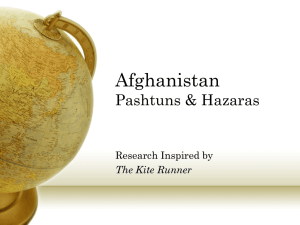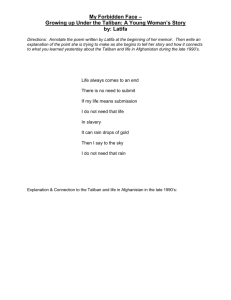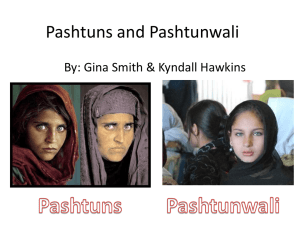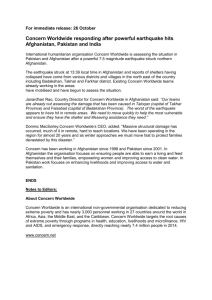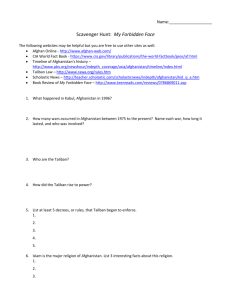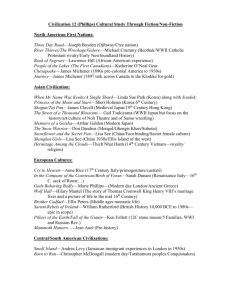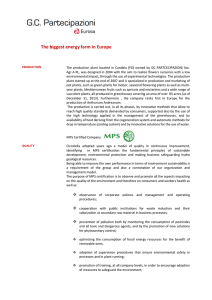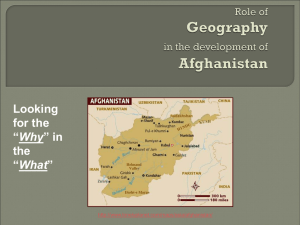September 21 2008 - SUNY Center for International Development
advertisement
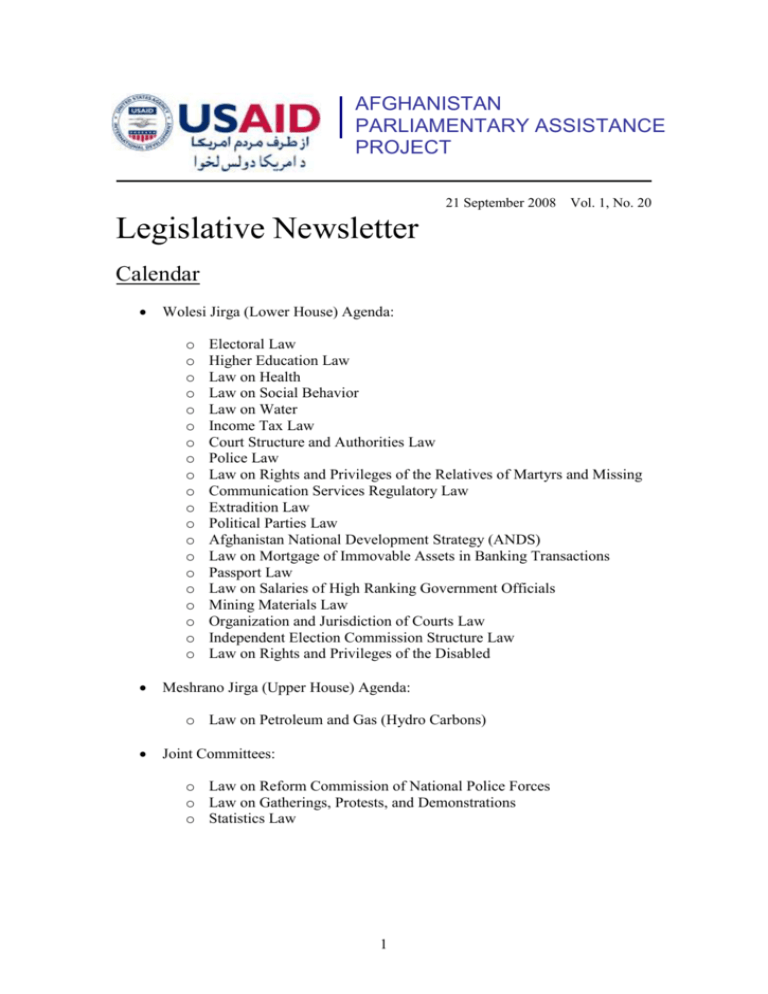
AFGHANISTAN PARLIAMENTARY ASSISTANCE PROJECT 21 September 2008 Vol. 1, No. 20 Legislative Newsletter Calendar Wolesi Jirga (Lower House) Agenda: o o o o o o o o o o o o o o o o o o o o Electoral Law Higher Education Law Law on Health Law on Social Behavior Law on Water Income Tax Law Court Structure and Authorities Law Police Law Law on Rights and Privileges of the Relatives of Martyrs and Missing Communication Services Regulatory Law Extradition Law Political Parties Law Afghanistan National Development Strategy (ANDS) Law on Mortgage of Immovable Assets in Banking Transactions Passport Law Law on Salaries of High Ranking Government Officials Mining Materials Law Organization and Jurisdiction of Courts Law Independent Election Commission Structure Law Law on Rights and Privileges of the Disabled Meshrano Jirga (Upper House) Agenda: o Law on Petroleum and Gas (Hydro Carbons) Joint Committees: o Law on Reform Commission of National Police Forces o Law on Gatherings, Protests, and Demonstrations o Statistics Law 1 Legislation The status update and description of bills remaining inactive for several weeks have been removed. They will be reintroduced as the drafts become active. Bills on the Assembly agendas will remain in the calendar above. Electoral Law The Electoral Law status remains unchanged from last week. A date for introduction in the Wolesi Jirga plenary is unknown. The Electoral Law establishes the electoral system and will regulate electoral issues, including voting centers/polling stations, observers, election campaigns, candidacy, and counting. Independent Election Commission Structure Law After approval by the Wolesi Jirga, the law is with the Wolesi Jirga Legal Research Board. The draft should be sent to the Meshrano Jirga by the end of the week. The law will outline the funding mechanism, structure, duties, authorities, procedures, and staffing of the body. Mining Materials Law The Meshrano Jirga sent the law to the Wolesi Jirga last week without major amendments. It is expected that the Wolesi will send the law to the President without asking for a joint committee meeting. The law will regulate mine ownership and control, security, management, private investment, minerals, and other affairs related to mining. Law on Salaries of High Ranking Government Officials The Meshrano Jirga’s minor amendments are under review by the Wolesi prior to the draft being forwarded to the President. The law determines salaries of all high ranking government officials. Law on Petroleum and Gas (Hydro Carbons) In brief: The law regulates petroleum and gas (Hydro Carbons), ownership, production, use, leases, contracts, research, and protection. Update: The bill is on the Meshrano Agenda this week. Law on Health 2 No date has been set for a planned discussion between the Wolesi Jirga Health, Sports, Youth, Labor and Laborers Committee and President Karzai, the Minister of Justice, and the head of Supreme Court regarding wording in Article 2, which MPs believe violates Article 52 of the Constitution guaranteeing free health care for all Afghans. The law will regulate health services, maintenance and expansion of private health services and health centers, implementation of health projects in different areas of the country, prevention of disease, and protection of mothers and newborns. Law on Social Behavior Further consideration of the law has been delayed until the end of Ramadan. The draft law includes a code for properly wearing a Hejab (a woman’s headscarf), and prohibitions on: pigeon flying; men and women in the same room at weddings; unrelated men and women speaking with each other in public; long hair on men; loud music at weddings; shops selling revealing clothing; and materials considered offensive to Islam, etc. Law on Water The draft is scheduled for consideration by an integrated meeting of Wolesi committees on September 21st. The law will regulate protection of water sources, their effective and sustainable use and distribution, and the rights of users according to Afghan tradition. Income Tax Law The Wolesi Jirga plenary approved 3 articles of the law last week. The law outlines taxes and taxing procedures according to Article 42 of the Constitution. Law on Rights and Privileges of the Disabled The Wolesi Jirga plans to send the law to the Meshrano by the end of the week. The law aims to integrate and support the disabled economically. Communication Services Regulatory Law The law is scheduled for consideration by a Wolesi integrated committee meeting. The draft addresses rules and regulations for the telecommunication companies, including the number of operators in the country, and control of communication services. 3 Passport Law The Passport Law is scheduled to be sent to the Meshrano Jirga by the end of the week. Organization and Jurisdiction of Courts Law The Wolesi Jirga Justice and Judiciary Committee completed consideration of the draft and distributed it to all Wolesi committees for review and input. An integrated meeting of Wolesi committees is scheduled to consider the draft on September 23rd. The law will regulate structure, content (staff) rights and responsibilities of the judicial branch courts. News Land Dispute Discussion Continues Discussions continued last week on the land dispute between repatriating Pashtun refugees and Uzbeks and Tajiks in Takhar Province. Honorable Sholgary (Ghazni), member of the government team sent to investigate the issue, reported back to the Wolesi Jirga that the Pashtun returnees have legal deeds, had been provided security, that the Red Crescent was supplying aid, and that ISAF was present. But the MP later added, “The returnees are not jailed, but they are kept at the prison compound. Their children are sick and suffering from vomiting and diarrhea and there is no doctor and medicine. Their meals and rugs are provided by Pashuns living in other villages of Takhar.” A heated exchange ensued with Honorable Majeedi (Paktia) threatening to leave the hall for not being able to adequately represent adequately the people. The MP said, “Don’t you know what is going on in Takhar Province? The government is ineffective and the Parliament is undisqualified. Where shall the people go to complain? They had better go to the Taliban who will listen to their complaints. ISAF is not listening to them. For what sin are the people suffering? They are suffering because they are Pashtuns and this is their sin…this is a very dangerous conspiracy planned against Pashtuns. I think it is an international conspiracy against Pashtuns.” Honorable Hussaini pressed Speaker Qanooni to pursue a meeting with President Karzai on the issue and accused the Speaker of turning a deaf ear to legislators’ concerns. “The Wolesi Jirga leadership is not respecting the MPs. We asked you many times that the issue of Takhar be resolved. We gave you a letter signed by 50 MPs. This is not only Khwaja Bahawodin’s issue but also Shindand and Helmand’s issue. If anything should happen in the future, you will be the one responsible.” Speaker Qanooni responded with, “The Administrative Board respects the MPs. First, it shall be discussed in the chairs’ commission Committee of Chairpersons and placed in the coming week’s agenda. Do not let the issue lead to tribal conflict. Let 4 us see what measures the government will take…the case of Khwaja Bahawodin is an executive, justice issue and we are not judges.” Later the Speaker suggested that the MPs, “make a proposal and cooperate. We have to call a joint meeting with the executive that will consist of the following: the Administrative Boards of Parliament, Interior Minister, Chair of Local Administrative Board, Migration Minister, Chair of the Supreme Court, and MPs, particularly Takhar MPs.” In the Meshrano Jirga, Honorable Moin Mrastyal pointed out that, “The issue of Bahawodin violates the Constitution. If the problem is not solved, the non-Pashtuns living in Pashtun areas will be expelled as well. It is a conspiracy for the division of Afghanistan.” Honorable Folad (Nangarhar) added: “It is clearly mentioned in Articles 39 and 40 of the Constitution that the properties of all Afghans are safe and that every Afghan has the right to live in any of the provinces. These people have deeds from the lawful government before the war, but due to the Russian bombing and cruelty, they migrated to Pakistan. During the Rabani presidency, the lands belonging to Pashtuns were given to Tajiks and Uzbeks. Rabani’s government was just a three-month old and unlawful government. These problems were created by his government.” Calling for unity, Honorable Ishaq Gilani said, “A big problem is developing from Kunar to Herat, it is a big calamity for Pashtuns today and I call upon the other tribes to stand beside Pashtuns and tighten the national unity because a big conspiracy is occurring.” Honorable Khadim (Herat) added, “The living tribes of Afghanistan are brothers – they had equal rights before the war. All the tribes have problems – the Kochi brothers have problems with Hazaras. The self interested people have changed the legal case to a political one. The crisis should be ended.” Senator Released by Taliban Honorable Senator Abdul Wali Ahmadzai (Logar), who was taken hostage by the Taliban two months ago, was released on September 14th. The Senator credited tribal elders for winning his release and denied that a deal had been struck. The Taliban claim that authorities freed three Taliban militants in exchange for the Senator. Upper House Walks Out to Protest Killing of Civilians The Meshrano Jirga on September 16th continued its protest of civilian casualties at the hands of international forces by halting work. The Deputy Secretary, Honorable Abdul Khaliq Hussaini, said that the senators wanted to send a strong message to the international forces that killing of women, children, and the elderly is unacceptable. In initiating the protest, Uruzgan Senator Hanif Hanafi said that a week ago international forces in two separate air strikes killed 21 civilians (including four of his relatives) in Uruzgan. “The fact was not reported by any international or local news agency. It is difficult to find the right number of civilian casualties because NATO and ISAF forces hide the number of deaths from us. Often the only witnesses are family members of those killed - if they survived the attack,” the legislator said. Assembly Staff Salaries Addressed 5 Answer: Corruption has approached its highest level. It is the main reason people keep a distance from Government. For example, Kunar Province has a dense forest of cedar. The cedars constitute an export item, but unfortunately they are smuggled to Pakistan. We requested the Government not to let this happen anymore, but to purchase the cedars from people and set up a commercial export base in the area. But the government made contract with smugglers to export the cedars. So the cedar income helps neither the government nor the people. The wood is not exported legally, but is smuggled to Pakistan. Despite having cedar in Afghanistan, we still import it from Russia. Question: How is the people’s economic situation? Answer: The people are in very bad economic situation and the NGOs’ work in the area is not effective. They are not working on infrastructure projects to improve people’s lives. The other reason for the insecurity is unemployment. The government has distanced itself from the tribal elders as well as Mujahiddin. The authorities are filling their pockets, and that is all. Question: What are the people’s impressions of the NATO forces operating in Afghanistan? Answer: At the beginning people were really pleased and welcomed NATO and the coalition forces to maintain security and pave the way for the reconstruction process, but it is regrettable that NATO started another war in Afghanistan by heavy handed searches, jailing, killing, and bombing of innocent people. In Kunar province, wherever the coalition forces make new bases, the situation becomes even worse. Question: Have you discussed with the President the necessities of the people? Answer: Yes we have discussed that issue several times. The National Solidarity Program started its work. This entity starts according to the people’s consultations. But those projects which Americans plan in Bagram are ineffective because they are made without consulting the people and the priorities of the people are not included in them, like the Food Program. Materials come, but they are distributed only among a few powerful people and the eligible people are ignored. We want more effective projects. Question: What kind of projects? Answer: Kunar Province has a lot of water. If we construct an electricity dam there, the neighboring provinces would benefit from that electricity. Job opportunities would be created for the youth and many families would be rescued from a bad economic situation. In my opinion, this is a better way to end war and insecurity, not killing and bombardments. Question: In the end, what is your message for the people and the government? 6 Answer: I am fully aware that the government cannot do anything. Today, the foreigners, headed by the USA, are authoritarians. You have beaten the Russian by us Pashtuns. That time you were good friends of Pashtuns, but why have you started to be their enemies? If you started hostility with Pashtuns by others’ provocation, I strongly declare that the friendship and hostility of Pashtuns are overt. They are not like [some of] your best friends who are good friends in front of you while always making propaganda against the government of Afghanistan, calling it as an infidel American government. Low salaries of National Assembly staff have contributed to higher attrition rates than other, often internationally-subsidized, ministries and government departments. Wolesi Jirga senior Administration has prepared a report on the chronic attrition rate and the disastrous consequences for the parliament is radical action is not undertaken without delay. Honorable Bashar Dost addressed the issue last week: “I want to talk and honorable MPs must listen because I am also one of you. I want to drive your attention to two points: Parliament employees have not yet received their salaries. The government is not paying salaries on time. And, one of the attendants showed me his salary slip that his net salary is 2800 AFS. When I calculated the amount, it cannot cover even a three-member family’s dried bread. Parliament has to decide to give one month extra salary as a Ramadan month bonus or Eid bonus. I have found a solution to the parliament employees and clerks that is to distribute absent MPs’ salary to the parliament employees.” Speaker Qanooni suggested that this was a good solution. Ministry Unresponsiveness Addressed in Lower House MPs last week discussed certain officials’ unresponsiveness to the Assembly’s requests for attendance. Honorable Sultan Zoi said, “We witnessed a big calamity of cold weather last year. This year it may be worste than that, but the Ministers are not coming and they do not respect Parliament. Honorable Mohammad Khan complained that the Transportation and Communication Minister has failed to appear after two requests while the Public Works Minister has also failed to respond. Honorable Sultanzoi suggested that the MPs issue a vote of no confidence when ministers fail to appear. Honorable Qasemi agreed. Speaker Qanooni suggested the offending ministers be given another chance. National Economy Committee Monitors Winter Preparation A joint meeting of the Wolesi Jirga National Economy Committee and Emergency Commission (which includes Ministry of Agriculture and Livestock, Urban Development, Public Health, and Afghan Red Crescent representatives) was held last week by request of the National Economy Committee. Issues discussed included food price increases, preparation for transport of food assistance to residents of remote areas, and readiness to provide services to citizens. The Emergency Commission officials shared their plans to avoid hardship and lost lives during the cold season. Legislators found the Commission members’ responses to their questions unsatisfactory and requested another meeting after the Commission reviews its plans. 7 [Type the the su inter You th any docu Text to form pul Interview with Shuja-ul-Mulk Jalala, MP from Kunar Province Question: How do you evaluate the security situation in Kunar Province? Answer: The security in Kunar is relatively good, but in Ghaziabad and Paich districts, close to Nuristan province, some foreign Taliban elements including Chechens and Uzbeks are seen. There is no Afghan Taliban in those areas. Question: I would like you to express your view about corruption in Kunar Province. Answer: Corruption has approached its highest level. It is the main reason people keep a distance from Government. For example, Kunar Province has a dense forest of cedar. The cedars constitute an export item, but unfortunately they are smuggled to Pakistan. We requested the Government not to let this happen anymore, but to purchase the cedars from people and set up a commercial export base in the area. But the government made contract with smugglers to export the cedars. So the cedar income helps neither the government nor the people. The wood is not exported legally, but is smuggled to Pakistan. Despite having cedar in Afghanistan, we still import it from Russia. Question: How is the people’s economic situation? Answer: The people are in very bad economic situation and the NGOs’ work in the area is not effective. They are not working on infrastructure projects to improve people’s lives. The other reason for the insecurity is unemployment. The government has distanced itself from the tribal elders as well as Mujahiddin. The authorities are filling their pockets, and that is all. Question: What are the people’s impressions of the NATO forces operating in Afghanistan? Answer: At the beginning people were really pleased and welcomed NATO and the coalition forces to maintain security and pave the way for the reconstruction process, but it is regrettable that NATO started another war in Afghanistan by heavy handed searches, jailing, killing, and bombing of innocent people. In Kunar province, wherever the coalition forces make new bases, the situation becomes even worse. Question: Have you discussed with the President the necessities of the people? Answer: Yes we have discussed that issue several times. The National Solidarity Program started its work. This entity starts according to the people’s consultations. But those projects which Americans plan in Bagram are ineffective because they are made without consulting the people and the priorities of the people are not included in them, like the Food Program. Materials come, but they are distributed only among a few powerful people and the eligible people are ignored. We want more effective projects. 8 Question: What kind of projects? Answer: Kunar Province has a lot of water. If we construct an electricity dam there, the neighboring provinces would benefit from that electricity. Job opportunities would be created for the youth and many families would be rescued from a bad economic situation. In my opinion, this is a better way to end war and insecurity, not killing and bombardments. Question: In the end, what is your message for the people and the government? Answer: I am fully aware that the government cannot do anything. Today, the foreigners, headed by the USA, are authoritarians. You have beaten the Russian by us Pashtuns. That time you were good friends of Pashtuns, but why have you started to be their enemies? If you started hostility with Pashtuns by others’ provocation, I strongly declare that the friendship and hostility of Pashtuns are overt. They are not like [some of] your best friends who are good friends in front of you while always making propaganda against the government of Afghanistan, calling it as an infidel American government. Acronyms: ANA – Afghan National Army ANDS – Afghanistan National Development Strategy ANP – Afghan National Police DIPR – Department of Information and Public Relations IEC – Independent Election Commission ISAF – International Security Assistance Force NATO – North Atlantic Treaty Organization NDS – National Directorate of Security 9
